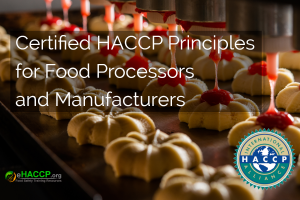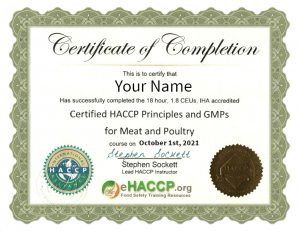HACCP and the BRC Scheme
HACCP is a requirement under BRC. Being HAACP certified is a preliminary step that cannot be overlooked. BRC is a Global Food Safety Initiative (GFSI)
HACCP is at the foundation of most if not all, GFSI schemes. More specifically, HACCP is a requirement under BRC. Being HAACP certified is a preliminary step that cannot be overlooked. BRC is a Global Food Safety Initiative (GFSI) benchmarked food safety standard covering food safety and management of product quality in food packing and processing operations.
The Global Food Safety Initiative (GFSI) is a private organization working as a “Coalition of Action” from The Consumer Goods Forum (CGF), bringing together retailers and brand owners (manufacturers) from across the CGF membership operating as multistakeholder governance to create “an extended food safety community to oversee food safety standards for businesses and help provide access to safe food for people everywhere.” GFSI’s work in benchmarking and harmonization aims to foster mutual acceptance of GFSI-recognized certification programs across the industry with the ambition to enable a “once certified, accepted everywhere” approach.
BRC (British Retail Consortium) is one of 20 GFSI (Global Food Safety Initiative) recognized audit Certification Programs. This food safety management program fulfills the criteria of the GFSI Benchmarking Requirements.
British Retail Consortium standards help promote consistency across the supply chain for food and ingredient manufacturers, wholesalers, and distributors. Each BRC audit also reduces the number of customer audits and consolidates customer requirements.
BRC is a codified Global Food Safety Initiative (GFSI) standard. It is a recognized audit scheme that incorporates: Hazard Analysis Critical Control Point (HACCP) Scopes for Good Agricultural Practices (GAPs) and Good Manufacturing Practices (GMPs).
Here are some mentions of HACCP in the BRC general regulations. They can also be found in the BRC’s Global Standard Food Safety (Issue 9) Guidelines published in August 2022.
BRC’s Global Standard Food Safety (Issue 9)
Part 1 – Introduction
What’s new for Issue 9?
The requirements of Issue 9 represent an evolution from previous issues, with a continued emphasis on management commitment, a food safety program (based on hazard analysis and critical control points (HACCP)), and a supporting quality management system. The continuing objective has been to direct the audit’s focus toward implementing good manufacturing practices.
Food safety legislation
- undertake a HACCP or risk-based approach to the management of food safety
The food safety management system – Principles of the Standard
- the development of a food safety plan – a HACCP-based hazard and risk assessment system (which provides a step-by-step approach to managing food safety risks)
A HACCP-based system (the food safety plan)
A HACCP-based system focuses on the significant food safety hazards related to products and processes that require specific controls to ensure the safety of individual food products or lines.
The Standard requires developing a food safety plan incorporating all the Codex Alimentarius HACCP principles. Such a plan requires the input of all relevant departments and must be supported by senior management.
Part 2 – Requirements
Fundamental requirements
The food safety plan – HACCP (2)
- Senior management commitment and continual improvement
1.1.4
- The effectiveness of the systems for HACCP, food defense and authenticity, and the food safety and quality culture plan.
2
The food safety plan – HACCP
- Fundamental – The company shall have a fully implemented and effective food safety plan incorporating the Codex Alimentarius HACCP principles.
2.1
- The HACCP food safety team (equivalent to Codex Alimentarius Step 1)
2.1.1
- The HACCP or food safety plan shall be developed and managed by a multi-disciplinary food safety team that includes those responsible for quality assurance, technical management, production operations, and other relevant functions (e.g., engineering, hygiene).
- The team leader shall have an in-depth knowledge of Codex HACCP principles (or equivalent) and be able to demonstrate competence, experience, and training. Where there is a legal requirement for specific training, this shall be in place.
- The team members shall have specific knowledge of HACCP and relevant knowledge of products, processes, and associated hazards.
2.1.2
-The scope of each HACCP or food safety plan, including the products and processes covered, shall be defined.
Etcetera. You’ll find HACCP mentioned, referred to, and quoted 85 times in the BRC’s Global Standard Food Safety (Issue 9) Guidelines. You can get a free version at the BRC’s website here: https://www.brcgs.com; select the Free PDF, and download it at no charge.
HACCP site certification requires the site to have prepared a HACCP plan, implemented it, and had it audited by a recognized 3rd party auditor.
Many companies offer this service, and training for the personnel is also required. Google “online HACCP training.”
Stephen Sockett
Ehaccp.org
+1 613-307-8988
email us here
Visit us on social media:
Facebook
Twitter
LinkedIn
Other
Video overview of eHACCP.org. Online HACCP training and certification for food companies; producers, processors / manufacturers, meat and poultry, seafood, etc.
Legal Disclaimer:
EIN Presswire provides this news content "as is" without warranty of any kind. We do not accept any responsibility or liability for the accuracy, content, images, videos, licenses, completeness, legality, or reliability of the information contained in this article. If you have any complaints or copyright issues related to this article, kindly contact the author above.



